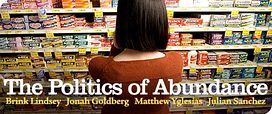Matt observes that entitlement spending has been rising over the past few decades, and that I think the past few decades have been pretty good ones. So, he asks, why should I worry about the continued growth of entitlements?
C’mon, Matt, you can do better than that. I think you’ll grant as well that recent times have been pretty good, even as Republicans have won seven of the past ten presidential contests. Does that mean you’d be happy with a continuation of the GOP’s winning streak?
Yes, we can have a thriving free society and a bloated, costly welfare state — after all, we do right now. But I think we can do better.
I worry about entitlements because I’m a liberal, not a social democrat. Which means, I don’t support collectivization for collectivization’s sake. If people can handle things on their own without government assistance and control, they ought to, for a whole variety of reasons. And since most Americans have the capacity to provide for their own retirement and (whether directly or through insurance) health care, there is no need for universal entitlement programs in those areas. I support means-tested retirement subsidies. And I support health care subsidies for the poor and chronically ill (i.e., those unable to provide for their own health care). But I oppose on principle programs that slosh gigantic sums from one cohort of the middle class to another.
And I think there are good reasons for other liberals to share my worries, even if they’re much more enthusiastic generally about redistributionist policies than I am. Matt acknowledges that the public’s aversion to high taxes imposes political constraints on government spending. Which means there are opportunity costs to spending on this rather than that. Specifically, spending profligately to subsidize people who don’t need the help means spending less on people who do. Already more than a third of federal spending goes to support people over 65; that share is projected to keep going up and up. The result is that other, worthier causes go begging for funds, and the squeeze is only going to get worse.
There’s more to liberalism than serving as tax collector for the gerontocracy — isn’t there?

